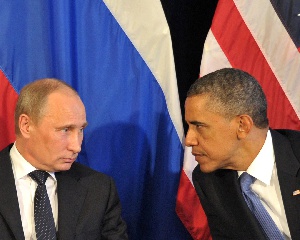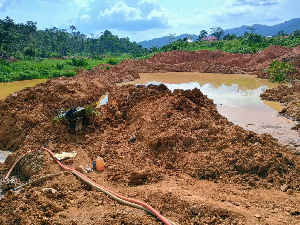In international law, the principle of non-intervention includes, but not limited to the prohibition of the threat or use of force against the territorial integrity or political independence of any state (Article 2.4 of the UN Charter).
The principle of non-intervention in the internal affairs of states also signifies that a state should not otherwise intervene, in a dictatorial way, in the internal affairs of other states.
The UN charter and declarations have over the past 50 years sought to illegalize intervention and/or interference. Today, the world still has to deal with foreign intervention and/or interference by superpower states and other states that are supported by superpowers that engage in such. These declarations are known to all member states of the United Nations.
Therefore, how and why is it possible that some member countries can unilaterally decide to intervene in other states either overtly or covertly? And the answer is very simple: Geopolitical interests. Many reasons could be given in order to engineer consent for unilateral attack on another country, but the real reasons are geopolitical interests.
The same is the situation in Syria; it’s war between two main superpowers – Russia and the U.S.
These two superpowers all have allies in the Middle East that share common geopolitical objectives. In the case of the United States, one can mention Turkey, Saudi Arabia, and Qatar, the main allies against the Syrian regime. In the case of Russia, one can mention Iran and Syria, and until recently Iraq. I will discuss the interest based on these two different coalitions.
U.S, Turkey, Saudi Arabia, and Qatar
For Russia, energy resources especially gas is seen as a tool to project power abroad especially in Europe. Russia provides more that 30% of gas and oil imported to the European Union and it is EU’s most imported supplier. According to 2013 data, Russia exported 153.9 million tonnes of oil (66% of its total export), 139 billion cubic metres (bcm) of natural gas (70%), and 60.5 million tonnes of coal (50%) to the EU.
This means that Russia enjoys monopoly vis-à-vis energy resources in the union and therefore has structural power to influence energy polices of the union and its member states. This is viewed as a geopolitical problem in Washington who does not want her influence in the EU challenged and one key solution to address this problem is to build pipelines from U.S energy resource rich allies in the Middle East into Europe.
With about 120 miles of coast line, Syria’s geographical location on the Mediterranean Sea makes it an obvious export for landlocked oil producers within the Middle East as well as Qatar seeking to export their oil and gas reserves to European markets. And whereas Syria’s strategic location and port on the Mediterranean might have been considered as an economic national set, it has now become a problem in modern day game of empires. Syria is now at the epicenter of a competing effort by Sunni Islamic Kingdoms and Western nation strategy of gas supplies to Europe and beyond.
Syria is apparently an already planned western ordered natural gas pipeline that will export Egyptian natural gas to Jordan, Syria, Lebanon, Turkey and then into Europe.
Evidently, this brought a strategic shift in U.S foreign policy in 2005. The Bush administration, in both its public diplomacy and covert operations significantly shifted in the Middle East according to Seymour Hersh in the New Yorker. Hersh further indicated that the U.S government and intelligence sources told him that Washington had “co-operated with Saudi Arabia’s government which is a Sunni in clandestine operations which is intended to weaken Iran’s ally Hezbollah in Lebanon” The US has also taken part in clandestine operation aimed at Iran and Syria, Hersh wrote.
He also noted that “the Saudi government, with Washington’s approval, would provide funds and logistical aid to weaken the government of P resident Bashir Assad of Syria”. In the view of the Israelis “putting such pressure on the Assad government will make it more conciliatory and open to negotiations”.
According to former French foreign minister, Roland Dumas, Britain had planned clandestine actions in Syria in 2009: “I was in England two year before the violence in Syria on other business”. He told French television, “I met with top British officials, who confessed to me that they were preparing something in Syria. This was in Britain not America. Britain was preparing gunmen to invade Syria,” a sovereign nation.
Readers would also recall that in 2009 President Abdullah Gu had plans to have a gas pipeline from Qatar to Turkey. “Other reports in the Turkish press said two states were exploring the possibility of Qatar supplying gas to strategic Nabucco pipeline project which would transport Central Asian and Middle Eastern gas to Europe bypassing Russia” – the US geopolitical endgame, the national.
A Qatar to Turkey pipeline might hook up with Nabucco at its proposed starting point in eastern Turkey, but with Syria and Iran as Russia’s ally; this is of course far from reality.
In a rather unsurprising turn of events, Iraq gave the green light for the signing of a framework agreement for the construction of pipelines to transport Iranian gas to Syria and then to Europe. This was seen as a direct slap in the face of Qatar’s plans. Therefore, a more favourable regime in Syria would suit Doha and Washington’s objective.
Russia, Iran and Syria
As economic sanctions against Iran have been rolled back by the west, Iran will soon be flooding the European market with oil and gas. Politico reports that Iranian gas could be a big opportunity for Moscow in the long term; “Iran’s reopening presents Russian companies such as Gazprom and Lukoil, which have been there before with the chance put money into potentially lucrative new projects, including oil and gas production, pipelines, petrochemicals, nuclear energy, and eventually, even liquefied natural gas (LNG) exports”.
Therefore “there may be a bigger convergence of business interests between Russia and Iran now, given that Russia is being increasingly sidelined by Europe”, said Ellie Geranmayeh, an Iranian expert at European Council on Foreign Relations.
Additionally, Moscow needs an economically strong ally like Iran to compete with since “Russia would be better positioned to protect its market share if it has a position in Iran. It’s all about controlling that gas; it’s a global market share whether the gas goes to Asia or to Europe”. Since Tehran is an ally to Moscow, Washington would not be able to exert pressure on Tehran to succumb to US hegemonic interests in Europe in order to punish Russia.
To Russia, Iranian gas coming to Europe would be a long term strategic sacrifice and/or option which are far better if the oil is from Qatar, a US ally.
The War in Syria
Given Syria’s geographical location as said earlier, both Tehran and Doha would need Damascus to be friendly – Bashar al-Assad would accept a Tehran deal and not a Doha deal which is why Riyadh with Washington’s approval would provide funds and logistical aid to weaken Damascus with a view to pressure him to be more open for talks.
The 2011 uprising would seem was triggered by problems of domestic energy shortages and climate induced droughts which led to massive food price hikes. This opportune time was quickly exploited as leaked emails from the private intelligence firm Stratfor confirms US and UK training Syrian opposition forces since 2011 aimed at eliciting the collapse of Assad’s regime from within as revealed by wikileaks cables.
As Washington and its allies waited for the Assad regime to capitulate, something far from reality, there has to be a catalyst that will force the regime out of office.
After the sarin attack on the Damascus suburb of Ghouta, Obama was ready to launch an allied airstrike to punish the Syrian government for allegedly crossing the “red line” he had set in 2012 on the use of chemical weapons – writes Seymour Hersh in the London Review of Books. Seymour further writes,
“We knew there were some in the Turkish government who believed they could get Assad’s nuts in a vice by dabbling with sarin attack inside Syria – forcing Obama to make good on his red line threat”, former US intelligence official who has access to current intelligence told me’.
This means that some members of the Turkish government planned the sarin gas attack which was meant to force the Assad regime out by a US led regime change project. A UN independent enquiry revealed, however that the gas was used by rebels and not the regime – a conclusion unacceptable to Washington and its allies.
Obama changed his mind after a deal brokered by Russia for Assad to relinquish his chemical weapons. British intelligence had obtained a sample of the sarin gas used in the 21st August attack and analysis demonstrated that the gas didn’t match the batches known to exist in the Syrian army’s chemical weapon arsenal. This discovery made it way in to the Joint Chiefs of Staff and heightened doubt in the Pentagon. Even this didn’t change the ‘Assad must go’ western policy.
ISIS, Al Nusra Front and Other Terrorist Groups
Terrorist groups like Isis or IS or Isil or Al Nusra or whatever the US wishes to call them were all tools available for the regime change project in Syria. This explains why after one year of coalition airstrikes, these terrorist groups increased and grew in numbers, finance and armament until Russia stepped in on September 30th 2015.
Russia was invited by Damascus, therefore it aerospace force operating in Syria is legitimate. Unlike the US and its allies as well as the EU that has sleepwalked into a refugee crisis. With the Obama administration’s $500 million US-led military undertaken a “train and equipped” programme for what it calls “moderate opposition” who are said to be fighting Isis but were in fact augmenting terror groups and fighting Assad’s forces.
They can’t therefore be called a legitimate opposition but the right term would be rebels.
Russia’s Case
Although Russia has an interest as explained above, Putin only came to Syria after invitation by Damascus. The Obama administration may be right about Russia bombing ‘their guys’ because according to Moscow through foreign Minister Sergei Lavrov, “If it looks like a terrorist, if it acts like a terrorist, if it walks like a terrorist, if its fights like a terrorists, it’s a terrorist, right?”. Right!!.
Therefore, any armed person against the regime is either a rebel or a terrorist and not a legitimate opposition. Besides, didn’t General Lloyd Austin, the Commander of US Central Command leading the war on ISIS tell congress on September 2015 before Russia started its airstrikes that there were only 4 or 5 moderate fighters fighting ISIS? Again, since when did rebels earn the right to be called opposition?
So you see, as demonstrated above, when geopolitical interests are at stake, powerful countries can break international law with impunity like in Syria’s case of unlawful intervention by Washington in an attempt to break the Moscow's oil and gas monopoly in Europe. But that’s not it; it’s who wins.
Today, Obama has changed his ‘Assad must go’ policy and fought for a ceasefire in Syria while Moscow on the other hand continues to strike terrorist and rebel targets. Moderate opposition as Washington calls these terrorists carry heavy guns as revealed by Seymour, and therefore need to be annihilated.
Putin has just established himself in the Middle East by teaching Obama how to play the game of chess – it’s called geopolitics.
Opinions of Sunday, 31 December 2017
Columnist: Michael Tawiah Bortei















